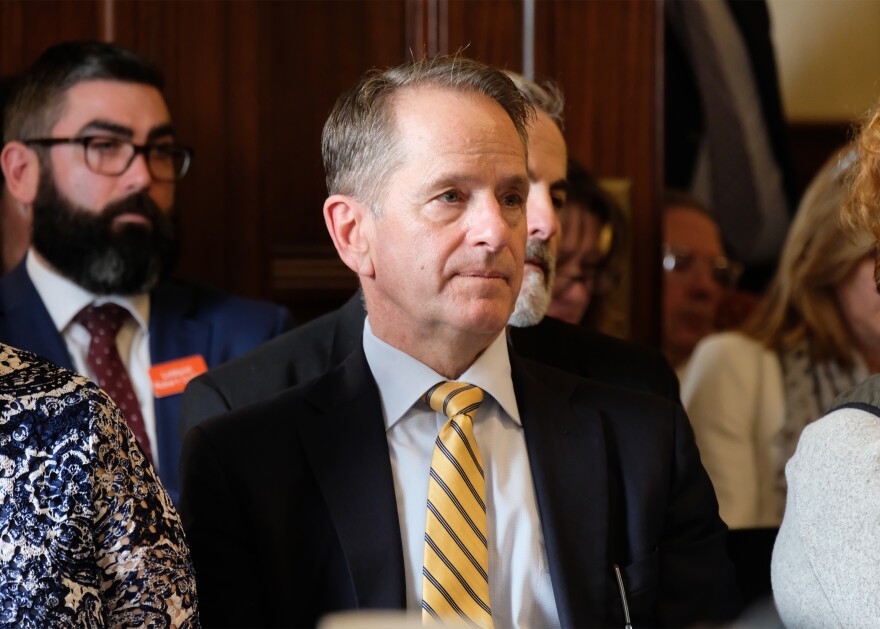Education Commissioner Frank Edelblut told school districts this week that they will see significantly less state aid for special education costs, leaving many worried for their students and local taxpayers.
Several local school leaders interviewed Friday said that because they have no discretion over special education costs, they’ll have to consider asking taxpayers to cover that loss of state aid or discuss cutting teaching and paraprofessional positions and enrichment programs like art and music.
“The state’s responsibility for funding education is suffering overall,” said Sydney Leggett, superintendent for the Plainfield and Cornish School Districts. “Small and rural districts feel that, and taxpayers are feeling that very heavily. This is just one more hit to local taxpayers where they are going to have to take on the burden themselves for something that is really the state’s responsibility.
Under Edelblut’s plan, the state would pick up 67.5% of its portion of special education aid in 2025, down from 87% this year and 98.3% in 2023. A school district that would have received $100,000 for a student, for example, would see that drop by $33,000 to about $67,000, under the change, Edelblut said in an interview Friday.
Edelblut pointed to an increase in the number of students qualifying for special education services and increased costs for those services. The number of students is up 12% over last year, at 870; 48 are new because the state must now cover costs for individuals up to age 22, one year longer than it had been.
Costs per students are up 9.3% over last year, from about $128,000 to about $140,000, he said.
Those 870 students represent a portion of all special education students in the state. Under the state’s complicated funding formula, local school districts are responsible for up to about $70,000 of a student's special education costs, a cap that includes most special education students. The state contributes to costs above that.
Meanwhile, Edelblut has kept the state’s budget for special education aid flat since 2021, at $33.9 million. As of Oct. 1, school districts had already submitted reimbursement requests totaling almost $50 million, he said.
Kendra Cohen has served as chairperson of the Deerfield School Board for a year and a half. She recalled how difficult it was to pass a budget last year due to a $1.2 million increase in the district's special education costs.
Those expenses can include speech and occupational therapists, expensive out-of-district placements, and transportation costs to those sites. Cohen noted that the state is already asking local school districts to cover a significant portion of their special education costs.
“We are in the middle of budget discussions now and we are going to need to talk about whether we keep the same roster of professionals,” Cohen said. “Do we maintain education as it is and go back to taxpayers and explain for the second year in a row that our budget increase is because of special education?”
“It’s incredibly hard just getting people to agree that (special education) is important, not even so much that we are mandated to provide it but that as a community this should be a priority,” Cohen said.
Jane Bergeron-Beaulieu, executive director of the New Hampshire Association of Special Education Administrators, said Friday that her nearly 300 members were still digesting Edelblut’s letter. It left her thinking about the state’s schools and its taxpayers.
“We can see both sides of it,” she said. “We know that nationally and in New Hampshire that we don't have adequate funding for our schools but more importantly, for special education.”
Bergeron-Beualieu said the increased costs are being driven by things that are out of districts’ control, including students with more complex needs and staff shortages that force districts to look to more expensive private contractors.
Edelblut did not ask to increase his funding for special education aid in his preliminary budget presentation to lawmakers this week and would not say whether he intends to once the governor and Legislature begin formalizing the next two-year budget early next year. He noted that he requested an increase in the 2017 and 2018 budgets, going from about $22 million to $30 million.
Instead, Edelblut wants the state to consider whether it can provide special education services more effectively and for less money. He said parents and educators frequently tell him they are unhappy with the services provided.
Edelblut said he doesn’t have a solution but believes school vouchers through Education Freedom Accounts can be one answer.
“Families are constantly coming up to us to say their kid had (a special education program) in school and are not in need of the services when they come out,” Edelblut said. “They are no longer suffering from anxiety and depression.”
According to the Department of Education, 377 students in the voucher program were receiving special education services in schools. The department is not tracking those students’ change in needs but Edelblut said his conversations with families has persuaded him they are succeeding without special education services.







